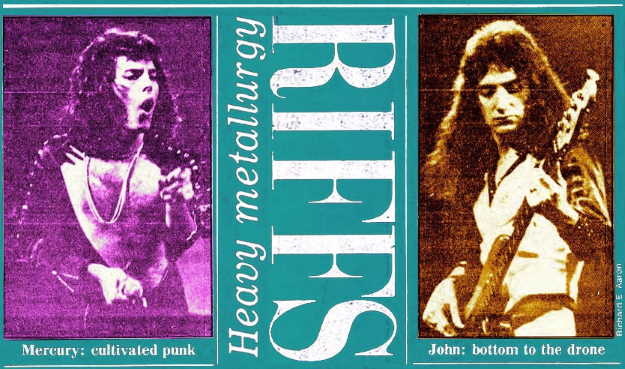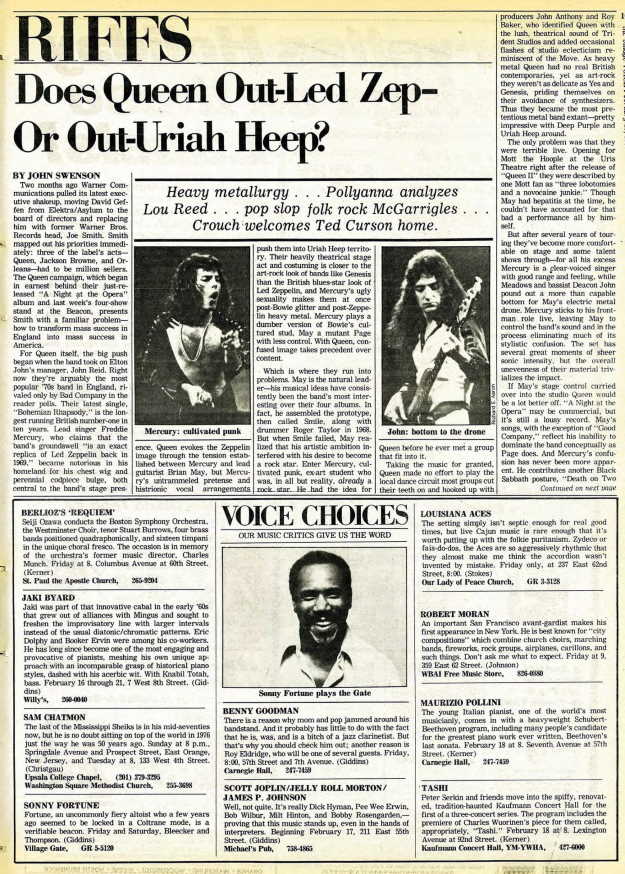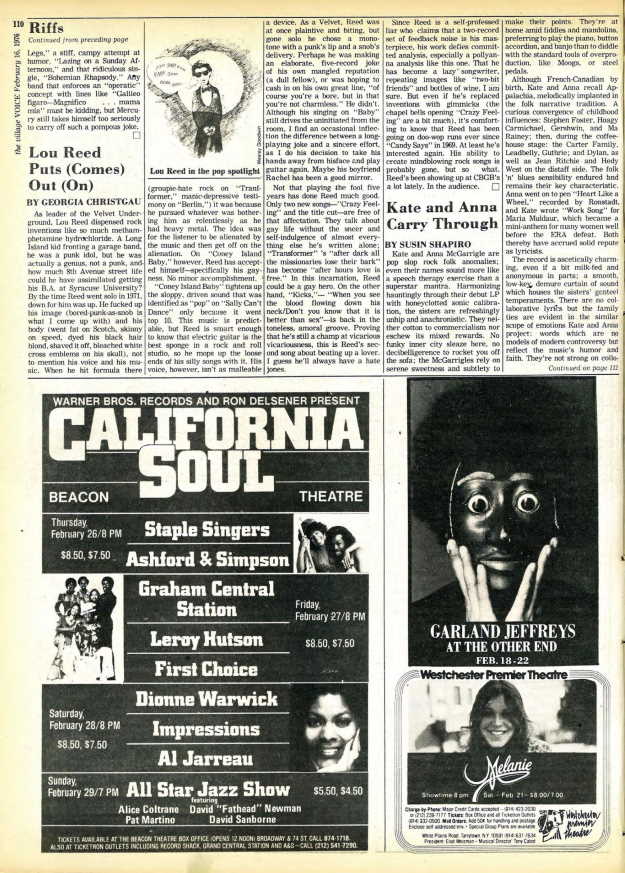| |
Taken from The Village Voice (Oct 28, 2020)
Does Queen Out-Led Zep - Or Out-Uriah Heep?
"Mercury plays a dumber version of Bowie's cultured stud, May a mutant Page with less control. With Queen, confused image takes precedent over content."
by John Swenson
Originally published: February 16, 1976

RCB VV COLLAGE |
RIFFS
Two months ago Warner Communications pulled its latest executive shakeup, moving David Geffen from Elektra/Asylum to the board of directors and replacing him with former Warner Bros. Records head, Joe Smith. Smith mapped out his priorities immediately: three of the label's acts - Queen, Jackson Browne, and Orleans - had to be million-sellers. The Queen campaign, which began in earnest behind their just-released "A Night at the Opera" album and last week's four-show stand at the Beacon, presents Smith with a familiar problem - how to transform mass success in England into mass success in America.
For Queen itself, the big push began when the band took on Elton John's manager, John Reid. Right now they're arguably the most popular '70s band in England, rivaled only by Bad Company in the reader polls. Their latest single, "Bohemian Rhapsody," is the longest running British number-one in ten years. Lead singer Freddie Mercury, who claims that the band's groundswell "is an exact replica of Led Zeppelin back in 1969," became notorious in his homeland for his chest wig and perennial codpiece bulge, both central to the band's stage presence. Queen evokes the Zeppelin image through the tension established between Mercury and lead guitarist Brian May, but Mercury's untrammeled pretense and histrionic vocal arrangements push them into Uriah Heep territory. Their heavily theatrical stage act and costuming is closer to the art-rock look of bands like Genesis than the British blues-star look of Led Zeppelin, and Mercury's ugly sexuality makes them at once post-Bowie glitter and post-Zeppelin heavy metal. Mercury plays a dumber version of Bowie's cultured stud, May a mutant Page with less control. With Queen, confused image takes precedent over content.
Which is where they run into problems. May is the natural leader - his musical ideas have consistently been the band's most interesting over their four albums. In fact, he assembled the prototype, then called Smile, along with drummer Roger Taylor in 1968. But when Smile failed, May realized that his artistic ambition interfered with his desire to become a rock star. Enter Mercury, cultivated punk, ex-art student who was, in all but reality, already a rock star. He had the idea for Queen before he ever met a group that fit into it.
Taking the music for granted, Queen made no effort to play the local dance circuit most groups cut their teeth on and hooked up with producers John Anthony and Roy Baker, who identified Queen with the lush, theatrical sound of Trident Studios and added occasional flashes of studio eclecticism reminiscent of the Move. As heavy metal, Queen had no real British contemporaries, yet as art-rock they weren't as delicate as Yes and Genesis, priding themselves on their avoidance of synthesizers. Thus they became the most pretentious metal band extant - pretty impressive with Deep Purple and Uriah Heep around.
The only problem was that they were terrible live. Opening for Mott the Hoople at the Uris Theatre right after the release of "Queen II" they were described by one Mott fan as "three lobotomies and a novocaine junkie." Though May had hepatitis at the time, he couldn't have accounted for that bad a performance all by himself.
But after several years of touring they've become more comfortable on stage and some talent shows through - for all his excess Mercury is a clear-voiced singer with good range and feeling, while Meadows and bassist Deacon John pound out a more than capable bottom for May's electric metal drone. Mercury sticks to his front-man role live, leaving May to control the band's sound and in the process eliminating much of its stylistic confusion. The set has several great moments of sheer sonic intensity, but the overall unevenness of their material trivializes the impact.
If May's stage control carried over into the studio Queen would be a lot better off. "A Night at the Opera" may be commercial, but it's still a lousy record. May's songs, with the exception of "Good Company," reflect his inability to dominate the band conceptually as Page does. And Mercury's confusion has never been more apparent. He contributes another Black Sabbath posture, "Death on Two Legs," a stiff, campy attempt at humor, "Lazing on a Sunday Afternoon," and that ridiculous single, "Bohemian Rhapsody." Any band that enforces an "operatic" concept with lines like "Galileo figaro - Magnifico ... mama mia" must be kidding, but Mercury still takes himself too seriously to carry off such a pompous joke.

RIFFS-Article: February 16, 1976 |
'RIFFS: Does Queen Out-Led Zep - Or Out-Uriah Heep?,' February 16, 1976

RIFFS-Article: February 16, 1976 |
|
|